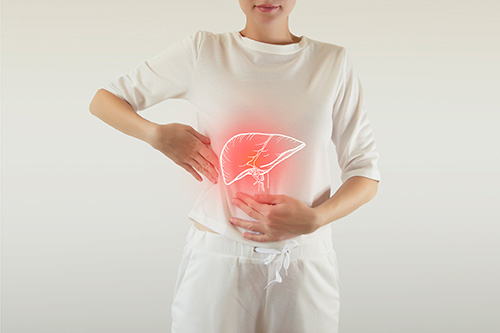Even the healthiest people have livers that are overworked to the point of causing symptoms on a regular basis. Think about it. You drink a glass of wine, eat a bagel, use your favorite shampoo, get a tattoo, take your daily prescription — basically go about your daily life — and your liver has you covered.And why is that a big deal? Because each of those activities unleashes toxins in your body that circulate until your liver takes them out one by one. Your liver is the designated detoxifier — the most powerful one in your body. It takes everything in, inspects and analyzes it, and then processes any poisons to get rid of what’s toxic or harmful. But even the liver has its limits.

An overworked liver leads to symptoms of hormonal imbalance
Your liver is also crucially important to good hormonal balance. Through its detoxification power, your liver keeps your sex hormones regulated and eliminates excess hormones — an ongoing job. But if your liver isn’t able to complete its tasks due to too many accumulated toxins, you’ll suffer from symptoms of hormonal imbalance. This important — but little-known — connection between your liver and your hormones can lead to one of the most frustrating symptoms of hormonal imbalance: stubborn weight gain. Other common symptoms include fatigue, brain fog and acne.
Ask yourself: “Could I be toxic?”
It’s easy to be toxic in today’s world. More and more foreign substances are coming at us all the time from our environment — it’s just a fact of life. Many of them act enough like hormones to throw off our hormonal balance. The amount and variety of these endocrine-disrupting chemicals in our food, cosmetics, and more is growing all the time, too. Often, these toxic substances accumulate silently, without us realizing it. For example, I love to eat green peppers. But even when I buy organic, they still come wrapped in plastic that contains endocrine-disrupting chemicals. In even tiny amounts, these endocrine-disrupting chemicals can trick your body into reacting to what it thinks is a huge flood of estrogen. But they can also do the opposite and tell your body that it’s facing a severe lack of estrogen, and that, of course, just causes problems in the other direction.
Your liver on a crash diet
You can also become toxic if you try to lose weight too quickly. Most of the destructive chemicals that enter our bodies are fat-soluble. When your liver can’t detoxify or neutralize all of them effectively, these poisons go straight into storage in your fat tissue. While they’re not as harmful in storage, they can be released during an aggressive weight loss program that breaks down your fat tissue. These released poisons go back into your body’s circulation, giving the liver even more to detoxify. You can also feel sick. You’ll be in the biggest trouble if you don’t support your body’s detox system with the right raw materials — balanced nutrition, fiber, and extra water to help move those toxins out of your system. You also may have heard of fatty liver, a growing problem that’s also known as “non-alcoholic fatty liver disease.” With this condition, the liver fills with fat and gets sluggish, leading to a slowing of hormone metabolism and many of the problems associated with hormonal imbalance. People who are overweight or obese and/or have insulin resistance are much more likely to develop fatty liver disease. Finally, I want to make sure you understand that these scenarios describe what can happen to an average person who has an overburdened liver. These are all very different from overt “liver toxicity,” which is a serious condition that occurs when chemicals or drugs damage the liver to such an extent that a person develops acute or chronic liver disease.
Are you treating your car better than your liver?
The smartest thing you can do today for your liver is to schedule a regular detox program. Whenever I think I don’t have the time for liver maintenance, I look at how I take care of my car. Every 5,000 miles I get an oil change, every 10,000 a tune-up. There’s a reason for that. I notice the difference it makes in how my car runs and performs. I also know it’s important prevention of larger problems down the line. My car is a good reminder to pencil in a personal cleanse on my “to do” list twice a year. A lot of women like to do a cleanse with the change of seasons, which I think is a good frequency too. If you’ve thought about a cleanse, you’ve probably come across many different ways of doing one. I’ve never been a big fan of strict water fasts, at least for more than 24 hours. Research shows that after 24 hours your glutathione levels tend to drop precipitously. That’s dangerous because glutathione is super important for detoxifying many of the chemicals in our environment. It’s also a critical antioxidant. On my cleanse, I always feel best when I eliminate all the foods that aren’t “clean” for at least five days. Here’s what that means for me:
- I eliminate grains because they’re such commonly reactive foods. No dairy, sugar, coffee or alcohol (for sure). For me, it’s also best to cut out nuts and peanuts.
- I make sure I take in nutrients that help my body detoxify. Juicing of fruits and vegetables is good because the detox system relies so heavily on vitamin and mineral cofactors and antioxidants.
- Because the detox process depends so much on amino acids, I also eat small amounts of organic and lean poultry, fish or other protein. Protein powders such as whey protein or pea protein are good too, and can be easily mixed into a smoothie.
- I keep a lot of fluids flushing through my body. Not just water, either. There are some wonderful detoxifying herbal teas available, made with liver-supporting herbs such as dandelion, milk thistle and burdock.
I’ll admit, I usually feel horrible for the couple of days – most likely due to some mobilization of toxins as my body prepares to move them out. It’s common for me to feel extra lethargic, spacey and headache-y. But by the end of the third day, everything changes for the better. At this point my sleep is sounder and more restful. I can feel myself just sinking into the mattress. I don’t wake up with a stiff jaw from clenching all night. I also have more dreams – many are more vivid than usual. I wake up remembering them and sometimes note how wild they were. I also feel sparkly — which may sound kind of hokey, but I don’t know a better way to describe it! My sensory awareness becomes more alive. Sounds are clearer. Colors are brighter and more intense. I really feel that my senses are able to pick up more. Which just tells me how much the toxic burden on my body had been dulling everything. So, make a plan to add a cleanse to your calendar twice a year. Because, after all, who doesn’t want to feel sparkly?










